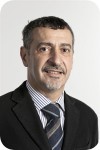Day 1 :
Keynote Forum
Vito Annese
Valiant Clinic, UAE
Keynote: Cancer risk of IBD therapy
Time : 09:30-10:15

Biography:
Vito Annese has received his Medical Degree at the Catholic University of Rome and subsequently the CCST in Internal Medicine and Gastroenterology at the same University. He also has received the Master Degree in Medical Sciences at the KUL University of Leuven in Belgium. He has over 30 years of experience in gastroenterology, with specific interest in functional and inflammatory bowel disorders. He has authored about 300 peer reviewed publications mainly in the field of genetic predisposition and clinical trials in IBD. In the last 10 years he has been head of Gastroenterology at the Research Hospital of S Giovanni Rotondo and at the University Hospital Careggi of Florence and in addition aggregate professor at the University of Foggia and Florence in Italy. Since one year he accepted the position of Consultant Gastroenterologist at the Valiant Clinic and community based physician at the American Hospital at Dubai, UAE.
Abstract:
Statement of the Problem: In general, when cancer develops or recurs in IBD patients, this may be related to the chronic intestinal inflammation, have no link with IBD or its treatment, and/or may be potentially influenced by the immunosuppressive drugs. The purpose of this review is to summarize the risk of cancer associated with IBD therapy.
Methodology: An extensive review of the literature has been undertaken and discussed among experts using the Oxford grade of evidences to help management.
Findings: Cancers caused by immunosuppressant drugs represent a minority of the incident cancers observed in patients with IBD. Regarding thiopurines several studies in referral centers or nationwide have suggested that cancer risk in general is not increased. However, the overall SIR for lymphoma is significantly increased in IBD patients receiving thiopurines, (5.7, 95% CI 3.2-10.1), but not in former users or never users. In addition, thiopurines also carry an excess risk of Non-Melanoma Skin Cancer (NMSC) with a pooled adjuster HR of 2.3 in a recent meta-analysis. Inhibition of TNF-alpha has been hypothesized to increase the overall cancer risk, however, an adequately powered nationwide study in Denmark have confirmed the data of meta-analysis and pooled analysis for either infliximab or adalimumab excluding an excess of risk. Reliable data regarding risk of cancer and therapy with Methotrexate and Cyclosporine in IBD are lacking. Data on methotrexate related to rheumatologic experience do no report an excess risk of solid cancer or hematological malignancies. Calcineurin inhibition is associated with an unequivocal excess risk of cancer in the post-transplant state, but is generally dose and duration-dependent therefore, is not an issue for IBD.
Conclusion & Significance: IBD patients are exposed to a background risk of cancer development, especially under uncontrolled inflammation. This risk is generally greater than that related to IBD therapy.
Keynote Forum
Higinio T Mappala
Jose Reyes Mem. Medical Center, Philippines
Keynote: The efficacy of bile acids in the treatment of non-alcoholic steatohepatitis: A 10-year systematic review

Biography:
Higinio T Mappala is a Medical Specialist IV at the Jose Reyes Memorial Medical Center, Manila, Philippines, a Board-certified Internist, Gastroenterologist, Endoscopist, Clinical Nutritionist and Clinical Toxicologist. He has served as a University Professor and Dean of 2 Medical Schools; a highly-regarded Researcher, with more than 50 scientific papers and more than 20 publications. He is a former Board Director of the Philippine Societies of Gastroenterology and Digestive Endoscopy; an online Research rater of McMaster, Canada and Online Dynamed Research peer-reviewer.
Abstract:
Non-Alcoholic Fatty Liver Disease (NAFLD) is one of the most common forms of chronic liver disease which may progress to Non-Alcoholic Steatohepatitis (NASH). Currently there are no therapeutic strategies for such disease. Only lifestyle modification through diet and exercise were proven to afford some benefit in patients with NAFLD. No pharmacologic agents have so far been approved for the treatment of NAFLD or NASH. Therefore, most clinical efforts have been directed at treating the components of metabolic syndrome, namely obesity, diabetes, hypertension and dyslipidemias. Other interventions are directed at specific pathways potentially involved in the pathogenesis of NAFLD, such as insulin resistance, oxidative stress, proinflammatory cytokines, apoptosis, bacterial overgrowth and angiotensin pathway. This lecture aims to show the potential of bile acids as a promising therapeutic option for NAFLD. This is a 10-year systematic review of the effects of bile acids on Non-Alcoholic Fatty Liver Disease (NAFLD). Bile Acids may yet prove to be an effective targeted treatment for non-alcoholic fatty liver disease.
